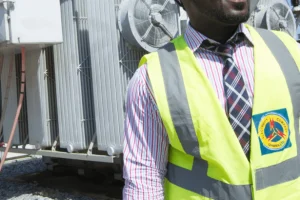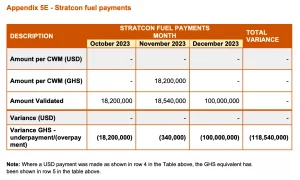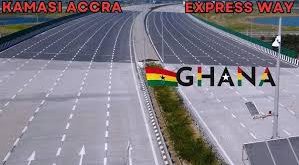
A damning audit has revealed that Ghana’s main electricity distributor spent GHS 136 million ($10.4 million) on emergency fuel purchases in just three months, spotlighting deep-rooted financial challenges facing the country’s energy sector as a new administration takes power.
The audit, conducted by PricewaterhouseCoopers (PwC) and released this week, found that the Electricity Company of Ghana (ECG) made these unbudgeted purchases between October and December 2023, with only GHS 18.2 million officially declared through proper channels.
“These emergency purchases often result in premium pricing, further straining ECG’s limited resources,” the audit states, highlighting a pattern of financial mismanagement that threatens Ghana’s power stability.
Stratcon emergency fuel payments by ECG, PwC Audit Report
The report attributes ECG’s reliance on emergency fuel purchases to inadequate planning and insufficient inventory management.
While these expenditures were deemed necessary to avert power outages, they diverted crucial funds from other obligations, including payments to independent power producers (IPPs).
PwC audit report uncovers GHS 567 million revenue discrepancy at ECG
23 illegal miners arrested for invading underground mines
Key issues highlighted in the report include:
Lack of clear procurement guidelines: ECG’s emergency procurement processes lack standardisation and transparency, increasing the risk of inefficiencies and financial mismanagement.
Higher costs: Emergency purchases often result in premium pricing, further straining ECG’s limited resources.
Weak oversight: The absence of independent monitoring mechanisms raises concerns about accountability and potential misuse of funds.
The revelations come at a critical time for Ghana’s energy sector, as newly inaugurated President John Dramani Mahama and his Energy Minister-designate, John Jinapor, inherit a utility company grappling with mounting debt and operational inefficiencies.
“The expenses associated with these fuel purchases affect the allocations to beneficiaries under the Cash Waterfall Mechanism,” PwC noted, referring to the system designed to ensure fair payment to power producers.

The audit also found that ECG operates 84 bank accounts across 20 banks, making financial oversight increasingly difficult.
More troubling still, the audit uncovered that ECG under-declared revenues by GHS 1.14 billion ($87.3 million) in the same period, raising serious questions about financial transparency. Independent Power Producers (IPPs) have faced payment delays, threatening Ghana’s power generation capacity.
President Mahama’s administration faces immediate pressure to address these issues. During his inauguration, he pledged to prioritize energy sector reforms, a promise now tested by these audit findings.
The audit suggests that Ghana’s energy sector debt, already exceeding GHS 8 billion ($612 million), continues to grow due to these inefficiencies.
Reform efforts will need to balance the urgent need for financial discipline with maintaining reliable power supply.
 Uniquenewsgh.com News, Politics, African News Updates & More
Uniquenewsgh.com News, Politics, African News Updates & More



